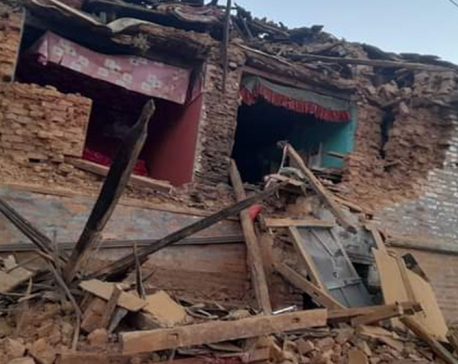
OR
#Opinion
Libertarian Municipalism: A Township Rebellion
Published On: September 1, 2022 07:45 AM NPT By: Bimal Pratap Shah

According to many senior Nepali economists, if the government is not able to correct the real estate prices, the economy will have to brace for difficulties in the future. This unfortunate state of the economy gives Nepal an even bigger reason to embrace libertarian municipalism. The beauty of libertarian municipalism is that it proposes the land and bureaucracy be placed increasingly in the custody of the community.
History is a witness to the fact that massive corruption, moral decline, bad governance, economic meltdown, mass exodus, hyperinflation, and the political elite’s non-accommodative attitude toward change appear to be the telltale signs of the final stages of a system. Mega-political shifts unfold ahead of the actual revolutions, typically starting with a clash between old and new values. The world is already witnessing such frictions. Citizens everywhere are challenging the conventional political ethos with new politics. People, especially the youth, who have traditionally been happy to be ordinary voters and tax-payers, are now demanding full participation in day to day governance of the state. They want to replace multi-party representative democracy with the Internet-enabled DIRECT DEMOCRACY to participate in collective decision-making in governance throughout the year.
Nepal is now at an extremely complicated political juncture. The friction between old and new values is at an all-time high. The status quo is yet to make sense of independent candidates' win in major cosmopolitan cities in the last local election. Many hardline supporters of the already outdated political ideologies and systems have compared Balen Shah's victory with that of Nani Maiya Dahal’s win during the Panchayat era. If there is any similarity between Shah’s win in 2022 and Dahal’s win in 1981, it is that both times the people of the capital city, especially the youth, voted against the incompetent status quo.
The Panchayat regime was clueless about the underlying dynamics that contributed to Dahal’s win in Kathmandu. Instead of respecting the Vox Populi, the system tried to make things difficult for Dahal. The status-quo of that time failed to understand that her win reflected a shift in the people’s consciousness. Furthermore, it was also a subtle sign of the mega-political change that was to unfold in a decade. Many of us, including the senior leaders of the political parties, still remember multi-party democracy was established less than a decade after Dahal’s win in Kathmandu. The change came so swiftly and unexpectedly that the Panchayat system was not able to make sensible political maneuvers in the rapidly changing geo-political scenario of that time. Likewise, there is a new mega-political shift just around the corner.
The transformation will be so epic that not only the multi-party representative democracy, but also the concept of a nation-state will also diminish because the world is at the beginning of the most sweeping revolution in history that will liberate individuals from the tyranny of nation-states, representative democracy, outdated political ideologies, corruption, and overtly hierarchical political parties. The change will be fueled mainly by the advancement in artificial intelligence and digital technologies like social media, cryptocurrency (crypto), mobile Internet, and Metaverse, to name a few.
Managing the complexity of governance and economy can be soon outsourced to data-driven intelligent digital technologies, making it possible to reimagine and implement new forms of social organizations. Elon Musk, in his recent article titled “Believing in Technology for a Better Future,” wrote: “As technology accelerates, it may one day surpass human understanding and control. Some are optimistic and some are pessimistic… But I believe that as long as we are not complacent and always maintain a sense of urgency, the future of humanity will be bright, driven by the power of technology.”
The Internet has already eroded the civic myth of nation-states as the concept of national borders dissolves when people are on the Internet. Also, ideas like representative democracy, centralized governance, national borders, hierarchical political parties, useless circus in parliament, and bloated dysfunctional bureaucracy seem somewhat alien to the new generation that grew up with the mobile Internet. Most of them have been using services like YouTube, Instagram, Facebook, Viber, WhatsApp, TikTok, and Gmail for more than a decade without any problem. Learning from their experience of using the excellent services provided by the tech giants, the new techno-friendly generation wants to change things for the better by coming up with a digitally powered political system that is fit for the 21st Century.
The Millennials and the Gen Y in Nepal feel they are being governed by the political mindset fit for the bullock cart era in the age of self-driving vehicles. They also feel Nepal’s politics only duels between the undemocratic top-down bureaucratic parties competing for electoral office. Once in office, the promises made during the election campaigns are quickly forgotten and people are left with a dysfunctional system, uncouth civil servants, hyper corruption, hyperinflation, bad governance, mismanagement of fiscal and monetary systems, economic despair, unemployment, and an ever-increasing exodus of youth. Indeed, an outdated political process belonging to the 18th Century has lingered for far too long in Nepal, and sadly, the only change the Nepali people have seen till now is the change in RHETORIC and DOGMA rather than STRUCTURE. This pattern has to be broken at all costs.
Kathmandu, Dharan, and Dhangadhi are providing the Nepali people with a sneak peek of the political arrangements of the future - libertarian municipalism - new politics that will capture the imagination of millions of people to ultimately disrupt the outdated political ethos of the last century. It is still unclear how the whole thing will unfold, but it is a scenario where political parties will share power with the community. The founding fathers of Nepal’s mainstream political parties did have good intentions of improving the lives of people, but those ideals, however, are no longer alive in big parties and winning the elections to hold and extend political power in parliament, and ministerial bodies have become the only political activity of the political parties. As a result, the word ‘politics’ in Nepal has become synonymous with a technique for holding power in representative bodies to accumulate huge sums of the taxpayers’ money through corruption. If the country does not deviate from this trajectory to embrace libertarian municipalism, the Nepali civilization’s total collapse is inevitable.
Simply put, libertarian municipalism is about reclaiming the public sphere by transforming corrupt politics into something ETHICAL in character and grassroots in the organization, emerging from young people’s desire to radically configure our decadent society into a communal one that is oriented toward meeting human, ecological, moral, communal, and economical needs. Libertarian municipalism will look like anarchy to those still guided by the old political mindset, but it is democratic to its core and nonhierarchical in its structure. Making sense of this new concept of governance will require breaking away from the hierarchical model of modern statecraft. Mayor Harka Sampang Rai is already catalyzing a socio-political movement in Dharan that has a character of libertarian municipalism. Hopefully, the mayors of other cities will also do the same.
Libertarian municipalism can also be thought of as citizens reclaiming their municipality from the highly corrupt, centralized state/government to delegate power to the municipalities, and more importantly, about allowing communities, neighborhoods, and assemblies of free citizens to formulate policies while allowing elected officials to perform the day-to-day administration. The central government will not vanish but only exist as a custodian. This transition, however, will not be peaceful and easy because the status-quo will probably try to obstruct this radical transformation, and even try to ban such political movements. Authoritarian countries have a habit of prohibiting disruptive techno-political innovations that seem too radical. For example, Nigeria banned cryptocurrency (crypto) in February of 2021 after finding out that the crypto market in African countries grew by 1,200 percent within a year.
Despite the ban, crypto transactions have continuously increased in Nigeria. Nigerians love crypto because they have been a victim of inflation and money debasement for a long time. As of August 15, 2022, the official inflation rate stood at 20 percent (the highest since 2005), but the unofficial inflation rate was almost 40 percent. In such a hyperinflationary environment, Nigerians are exploring the idea of creating a new economy using the Bitcoin network. Now, crypto evangelists are working to establish a Bitcoin Village in Lagos to explore the possibilities of Bitcoin’s peer-to-peer network to quell the shortcomings of corruption and money debasement. The Bitcoin Village also hopes to attract top technology talent from the world.
The recent crash of the Naira, Nigeria’s national currency, has made alternative assets like Bitcoin and stablecoins even more attractive options for Nigerians to protect their wealth from the ever-devaluing currency. Also, Naira has been experiencing tougher times recently because of the global economic turbulence. Things were made even worse by Nigeria’s Central Bank’s governor. The governor issued a ban on withdrawing large sums of money from banks to prevent the people from buying US dollars in the blackmarket. Since Nigeria is an extremely corrupt country, the citizens feel bitcoin is the best hedge against hyperinflation because investing in real estate is not possible for everyone. Another reason cryptos are getting popular is that the Nigerian people are well informed about the concept of hyperinflation - money printing is employed as the principal method of government finance as money printing is part of the routine operation of the government.
Nigeria is now one of the top crypto trading countries in the world. Nigerians have traded bitcoins worth USD 1.16 billion since the ban in 2021, with the bitcoin trade volume reaching USD 400 million just in the first six months of 2022. Nepal’s crypto trade volume is still unknown. Nigerians have been buying stronger foreign currencies in the black market to protect their hard-earned wealth. Cryptos have now become even more attractive in the country because the Nigerian currency crashed to a historic low at the end of July 2022. The official exchange rate in the first week of August 2022 was 678 Naira to the dollar, but the Nigerian currency was trading at around N768 to the dollar in the black market.
The Nigerian people have been extremely frustrated with the government for many years because the Naira is continuously getting devalued with very little demand in the global market due to a weak export base. The government and the central bank still don't seem to have any clearly-defined strategy in place to deal with the effects of global headwinds. The country’s economy is already in a very bad shape. As a result, the Nigerian people are rushing to purchase stronger currencies like the US dollar and cryptos like Bitcoin to park their wealth. This has created a boom in the illegal purchase of cryptos and foreign currency. Things will not likely improve anytime soon because the government is also getting a kickback from the black marketeers.
Nigerians have traditionally regarded real estate to be a good hedge against inflation. Investment in real estate has increased for many decades despite the increased insecurity and lack of effective management of fiscal systems. It is the same in Nepal as well. However, the darker reality of this boom is that if the real estate prices are not corrected on time, the bubble will ultimately burst like in the US in 2008 and this year in China. The Chinese economy is facing difficulty now because one-third of China’s economic activities consist of real estate. Also, housing is the most important investment for most Chinese people, accounting for 70 percent of household wealth.
Buying property was considered a safe investment in China. Now, it has become a source of discontent and anger for many. Chinese homebuyers have been making an advance payment to property developers even before the property is built. Unfortunately, instead of using the advance payments to build the homes, the property developers are using the money to buy land to supercharge growth and expansion - a good strategy as long as the demand for property remains high. The land price skyrocketed because people were competing to make payments a year in advance for houses/apartments that were yet to be built. If things are not corrected quickly, China could face a financial crisis similar to that of the US in 2008.
The collapse of the US housing bubble, which peaked in the Fiscal Year 2006-2007, was the primary cause of the financial crisis. Also, lower interest rates, easy credit, INSUFFICIENT regulation, and toxic subprime mortgages led to the worst economic crisis. The US was able to come out of the economic shock because the US economy is diversified and the government mobilized its bodies with top brains to rapidly maneuver course correction. China will also likely contain the problem because the economic giant also has highly educated and competent people in government leadership. Nepal will not be so fortunate because the country has suffered from a brain drain for many decades.
The uncontrolled real estate boom is not good for the future of Nepal’s undiversified economy. The rise in real estate has increased rent, in turn, making everything more expensive. As a result, it's extremely difficult to sustain businesses because of high real estate prices. This has increased unemployment, forcing poor youths to head for the Gulf countries, the UK, or elsewhere to make a living. According to many senior Nepali economists, if the government is not able to correct the real estate prices, the economy will have to brace for difficulties in the future. This unfortunate state of economy gives Nepal an even bigger reason to embrace libertarian municipalism. The beauty of libertarian municipalism is that it proposes the land and bureaucracy be placed increasingly in the custody of the community.
Effectively managing the economy is an extremely difficult task even for G7 countries blessed with highly competent bureaucracy and political leadership. Nepal needs economists, ministers, and bureaucrats on a par with those of G7 countries, China, and India because there is no such thing as a well-planned economy. The ONLY plan should be to populate the government with competent senior economists who have graduated from top universities (e.g. Harvard University and Oxford University) as ministers and bureaucrats. This is a crazy idea that has never been tried and tested in Nepal. It is worth the experiment because entrusting the current political setup with the task of managing the country’s economy is like handing over your Tesla's self-driving software to a bullock cart mechanic for repairs. Managing the complexity of libertarian municipalism will require even more graduates from Ivy League Universities.
In a nutshell, libertarian municipalism is about replacing representative forms of democracy with an inclusive, participatory system where every community member has equal power over the matters of governance that impact them.
You May Like This

Evidence-Based Policy Making in Nepal: Challenges and the Way Forward
“Life and health can never be exchanged for other benefits within the society.” With this vision, the Swedish Parliament in... Read More...

Nepal's Seismic Struggle and Ongoing Recovery Dynamics
Nepal's seismic vulnerability is highlighted by its history of frequent and devastating earthquakes. Over the past 52 years, from 1970... Read More...

Equality under the Law: Examining Legal Principles across Different Scales
The suspension of Nepali Congress (NC) MP Tek Prasad Gurung, who was found guilty on corruption charges, has confirmed that... Read More...



Just In
- World Malaria Day: Foreign returnees more susceptible to the vector-borne disease
- MoEST seeks EC’s help in identifying teachers linked to political parties
- 70 community and national forests affected by fire in Parbat till Wednesday
- NEPSE loses 3.24 points, while daily turnover inclines to Rs 2.36 billion
- Pak Embassy awards scholarships to 180 Nepali students
- President Paudel approves mobilization of army personnel for by-elections security
- Bhajang and Ilam by-elections: 69 polling stations classified as ‘highly sensitive’
- Karnali CM Kandel secures vote of confidence
















Leave A Comment